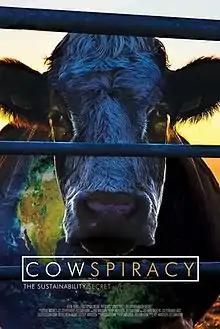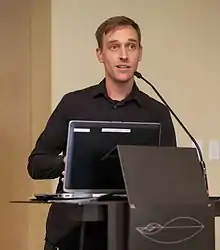Cowspiracy
Cowspiracy: The Sustainability Secret is a 2014 documentary film which explores the impact of animal agriculture on the environment, and investigates the policies of a few environmental organizations on this issue. The film looks at various environmental concerns, including global warming, water use, deforestation, and ocean dead zones, and suggests that animal agriculture is the primary source of environmental destruction.
| Cowspiracy: The Sustainability Secret | |
|---|---|
 Movie Poster for Cowspiracy | |
| Directed by | Kip Andersen Keegan Kuhn |
| Produced by | Kip Andersen Keegan Kuhn |
| Starring | Kip Andersen Howard Lyman Richard Oppenlander Michael Pollan Michael Klaper Will Tuttle Will Potter |
| Cinematography | Keegan Kuhn |
| Edited by | Kip Andersen Keegan Kuhn |
Production companies | |
Release date |
|
Running time | 91 minutes |
| Country | United States |
| Language | English |
The Union of Concerned Scientists has disputed the film's assertion that the majority of greenhouse gases driving climate change are produced by animal agriculture, as this runs counter to scientific consensus which is that the main cause is fossil fuel emissions.[1][2] A 2018 peer-reviewed meta-analysis also found that a “no animal products” scenario delivers a 28% reduction in global greenhouse gas emissions across all sectors of the economy, as opposed to the film's claim of 51%.[3]
Synopsis
The documentary was directed by Kip Andersen and Keegan Kuhn, and explores the impact of animal agriculture on the environment, and investigates the policies of environmental organizations on this issue. Environmental organizations investigated in the film include Greenpeace, Sierra Club, Surfrider Foundation, Rainforest Action Network, Oceana.[4][5][6][7]
Production
The film was crowdfunded on IndieGoGo, with 1,449 contributors giving $117,092. This funding was 217% of their goal, and it allowed them to dub the film into Spanish and German and subtitle it into more than 10 other languages, including Chinese and Russian.[8][9] Screenings are licensed through the distributor, as well as through Tugg Inc.[10]
An updated version of the documentary, executive-produced by Leonardo DiCaprio, premiered globally on Netflix on September 15, 2015.[11]
The 2017 documentary What the Health was written, produced, and directed by the same production team (Kip Andersen and Keegan Kuhn) as Cowspiracy.[12]
Featured individuals

The following individuals were featured in the film:
- Michael Klaper (physician, author, advisor)
- Howard Lyman (former rancher, author, activist)
- lauren Ornelas (Food Empowerment Project)
- Michael Pollan (author, lecturer)
- William Potter (journalist)
- Kirk R. Smith (environmental health sciences)
- Josh Tetrick (founder of Hampton Creek)
- John Jeavons (biointensive agriculture advocate)
Reception
In a review in the SFWeekly, the documentary was called "a pile of self-indulgent, vegan propaganda". CinemaSpin said it did "not discuss nuances, instead opting for a simplistic “meat bad, vegan good” message".[13]
Cowspiracy won the Audience Choice Award at the 2015 South African Eco Film Festival,[14] as well as the Best Foreign Film Award at the 12th annual Festival de films de Portneuf sur l'environnement.[15] It was also nominated for Cinema Politica’s 2015 Audience Choice Award.[16]
The Union of Concerned Scientists has disputed the film's assertion that the majority of greenhouse gases driving climate change are produced by animal agriculture, as this runs counter to scientific consensus which is that the cause is fossil fuel emissions.[1][2]
Doug Boucher, reviewing the film for the Union of Concerned Scientists, disputed the film's claim that 51% of global greenhouse gases are caused by animal agriculture. Boucher describes the 51% figure as being sourced from a 2009 Worldwatch Institute report by Robert Goodland and Jeff Anhang,[17] not from a peer-reviewed scientific paper. Boucher asserted methodological flaws in Goodland and Anhang's logic, and claims that the scientific community has formed a consensus that global warming is primarily caused by humanity's burning of fossil fuels.[1] Boucher states that the scientific consensus is that livestock contribute 15% of global greenhouse gas emissions - far lower than the 51% claimed by the film.[1] Boucher's review concludes: "Movies like Cowspiracy aren’t believable, not only because of how they twist the science, but also because of what they ask us to believe: that the fossil fuel industry—the ExxonMobils of the world—aren’t the main cause of global warming... and that thousands of scientists have covered up the truth about the most important environmental issue of our time."[1]
A 2018 peer-reviewed meta-analysis estimates that the food supply chain is responsible for 26% of annual anthropogenic GHG emissions. Within the food supply chain, animal products (including fish farms) account for 56-58% of GHGs,[3] implying that animal products account for roughly 15% of total anthropogenic GHG emissions.[18][19] In a 2019 erratum to the meta-analysis, the avoided annual greenhouse gas emissions arising from a "no animal products" scenario are estimated at 28% of the total, which includes 8.1 Gt CO2 of removal by trees regrowing on land no longer required for livestock.[20]
A 2019 Forbes article quotes Steven Chu, the Nobel Prize winner and former U.S. Secretary of Energy, stating: “Let me say it again: agriculture and land-use generates more greenhouse gas emissions than power generation." The article references the 2009 Worldwatch Institute article that estimates livestock are responsible for at least 51% of human-induced greenhouse gas emissions.[21]
See also
References
- Boucher, Doug (10 June 2016). "Movie Review: There's a Vast Cowspiracy about Climate Change". The Equation blog. Union of Concerned Scientists. Retrieved 12 June 2016.
- Herrero, Mario; Wirsenius, Stefan; Henderson, Benjamin; Rigolot, Cyrille; Thornton, Philip; Havlík, Petr; de Boer, Imke; Gerber, Pierre (November 2015). "Livestock and the Environment: What Have We Learned in the Past Decade?". Annual Review of Environment and Resources. 40: 177–202. doi:10.1146/annurev-environ-031113-093503.
- Poore, J.; Nemecek, T. (1 June 2018). "Reducing food's environmental impacts through producers and consumers". Science. 360 (6392): 987–992. Bibcode:2018Sci...360..987P. doi:10.1126/science.aaq0216. PMID 29853680.
- Kanner, Ellen (August 4, 2014). "Meatless Monday -- 'Cowspiracy:' The One Thing No One Talks About". Huffington Post. Retrieved October 9, 2014.
- Animal Agriculture: A Neglected Agent of Global Warming? The co-producers of the documentary film "Cowspiracy" discuss the environmental impact of Intensive animal farming - and why mainstream organizations have been silent about it. November 20, 2014, The Real News
- "Cowspiracy". Village. February 19, 2015. Retrieved 2015-03-04.
- "Burgers Are Ending the World, Says Cowspiracy". SF Weekly. Jun 25, 2014. Retrieved 2015-03-04.
- "Cowspiracy IndieGoGo campaign page".
- Alison Homewood. "Beware Cowspiracy – and the spread of the vegan virus -- New Internationalist". New Internationalist.
- "Cowspiracy page on Tugg".
- "Exclusive: Interview With Directors Of 'Cowspiracy: The Sustainability Secret' On Netflix, A Controversial New Documentary". Decider. August 27, 2015. Retrieved 2015-08-28.
- Jackie Day (January 23, 2016). "Cowspiracy Film Makers Announce NEW film: What the Health!". My Vegan Journal.
- "Cowspiracy: The Sustainability Secret". CinemaSpin. March 29, 2015. Retrieved September 21, 2016.
- "Cowspiracy Wins Audience Choice Award". The South African Eco Film Festival. April 9, 2015. Archived from the original on April 16, 2015. Retrieved 2015-04-09.
- "Le FFPE récompense les films gagnants de la 12e édition". Festival de films de Portneuf sur l'environnement. April 27, 2015. Retrieved 2015-04-28.
- "Vote for the 2015 Audience Choice Award!". Cinema Politica. April 6, 2016. Retrieved 2016-04-24.
- Goodland, Robert; Anhang, Jeff (Nov–Dec 2009). "Livestock and Climate Change: What if the key actors in climate change were pigs, chickens and cows?". Worldwatch Magazine. Worldwatch Institute. pp. 10–19. S2CID 27218645.
- "Tackling climate change through livestock // FAO's Animal Production and Health Division". Fao.org. Retrieved 16 August 2018.
- Gerber, P.J., Steinfeld, H., Henderson, B., Mottet, A., Opio, C., Dijkman, J., Falcucci, A. & Tempio, G. (2013). Tackling climate change through livestock – A global assessment of emissions and mitigation opportunities (PDF) (Report). Food and Agriculture Organization of the United Nations (FAO). pp. 1–139. ISBN 978-92-5-107921-8. Retrieved 3 October 2019.CS1 maint: uses authors parameter (link)
- Poore, J.; Nemecek, T. (21 February 2019). "Erratum for the Research Article "Reducing food's environmental impacts through producers and consumers" by J. Poore and T. Nemecek". Science. 363 (6429): eaaw9908. doi:10.1126/science.aaw9908. PMID 30792276.
- McMahon, Jeff. "Meat And Agriculture Are Worse For The Climate Than Power Generation, Steven Chu Says". Forbes. Retrieved 2019-12-08.
External links
| Wikiquote has quotations related to: Cowspiracy |
